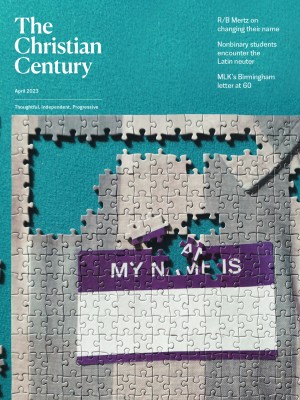Thinking through abortion ethics in the classroom
What if we began with character, my students and I asked, rather than rights?

This fall I taught a class on abortion, after 15 years of giving it a single week in my bioethics class. The Supreme Court’s decision to overturn Roe v. Wade presented an opportunity to wade through the waters of what is arguably America’s most intense moral debate.
Our society tends to make abortion all about rights. Is there a basic right to abortion, and how does a woman’s right to her body relate to a fetus’s right to life? Roe decided that the mother’s rights trumped those of the fetus based on a constitutional right to privacy.
Read our latest issue or browse back issues.
Around the same time, philosopher Judith Jarvis Thomson wrote the influential essay “A Defense of Abortion.” She used a series of thought experiments to lead readers to the conclusion, “If a human being has any just, prior claim to anything at all, he has a just, prior claim to his own body.” Thomson’s exasperation spoke for many: “Women have said again and again ‘This is my body!’ and they have reason to feel angry, reason to feel that it has been like shouting into the wind.” Dorothy Roberts’s book Killing the Black Body showed how the disregard piled up disproportionately for women of color, lending further moral weight to Roe’s legal rights.
Yet legalizing abortion as a woman’s right begged the familiar question, What about the rights of the fetus—or, as many think of it, the baby? The pro–abortion rights answer was that rights are tied to personhood and a fetus isn’t a person. How convenient, thought abortion opponents.
The abortion debate, as our class soon discovered, rarely gets beyond this contest of rights and the ensuing fight over personhood, a political stalemate hung up on a metaphysical muddle. Perhaps this is the best we Americans can hope for. In a diverse democracy, maybe rights—a lowest-common-denominator approach to communal life—is our best bet.
But as students also discovered, the stalemate destines us to divisive politics. Rather than think together about difficult questions, we divide ourselves on rights and then hand things off to others to sort out. We look to the Supreme Court to save us and curse it when it doesn’t.
A whole judicial philosophy has grown up in this sad state of affairs, one that purports to interpret the Constitution by sealing it off from the present. Originalism promises to save us, namely, by replacing us with something decidedly not us: some prelapsarian original of which we mere citizens are at best pale copies. Originalism turns out to give us just another version of us, though one conspicuously predisposed to the rearguard conservativism heralding originalism in the first place. Really what originalism did was expose the theocratic center always lurking beneath the antiabortion surface.
Those these days fashioning themselves “Catholic integralists” speak unabashedly about their long-term goal of replacing the secular liberal state with a Catholic one. They chide their originalist forbears for a spiritual failure of nerve and dream out loud of a world beyond originalism’s false humility, a happily illiberal theocracy that would utilize the administrative state to enforce moral codes with little room for talk about reproductive rights. If students in my class found this vision frightening, they also appreciated its willingness to come clean about originalism’s endgame.
Students learned to read the post-Roe left as a political cautionary tale, cultural elites who fell asleep at the wheel as conservative Christians mobilized a massive backlash. The resources brought to bear by the religious right’s surprising coalition of Catholics and evangelicals were superseded only by its patience. It would take five decades, and boatloads of money and maneuvering, but these Christians got what they wanted in the end, which for them is just the beginning.
Against this, students in the class, almost all committed abortion rights supporters, knew they needed something more than rights. At the same time, they weren’t ready for the kind of integrated moral life that might actually ground rights. They were, oft unbeknownst to them, looking for something that, rather than reverting to lowest common denominators, could gather a people around common goods.
The path forward, according to philosopher Rosalind Hursthouse, sits right under our noses but remains obscured by all the attention given to rights. There is a way of thinking about life, community, children, and so on that offers boundless resources for thinking together about abortion. The students saw how for Hursthouse the experience of miscarriage, suffered by millions of women, reveals just how strange the abortion debate has become: it cannot countenance the ways people already know how to hold in balance the lives of children, mourning miscarriages neither as they would the death of infant children nor as mere fodder for rights.
The problem with the debate, students learned from Hursthouse, was the way it was set up to miss the features of moral life best suited to discussing abortion. Because it presented things in such polarizing terms, it missed much of the middle, which is where most people live. “Love and friendship do not survive their parties’ constantly insisting on their rights,” writes Hursthouse, “nor do people live well when they think that getting what they have a right to is of preeminent importance; they harm others, and they harm themselves.”
Calling us to communities of character—something Christianity aspires to when not given to self-caricaturing—rather than to lives staked on individual rights, Hursthouse makes a rather startling claim: “Whether women have a moral right to terminate their pregnancies is irrelevant for it is irrelevant to the question, ‘In having an abortion in these circumstances, would an agent be acting virtuously or viciously or neither?” It was Hursthouse’s belief that bringing that question into focus, what counts as not reverting to lowest common denominators, would sharpen the moral sensitivities needed to talk together about abortion.
That, I want to believe, is what happened for our class.






